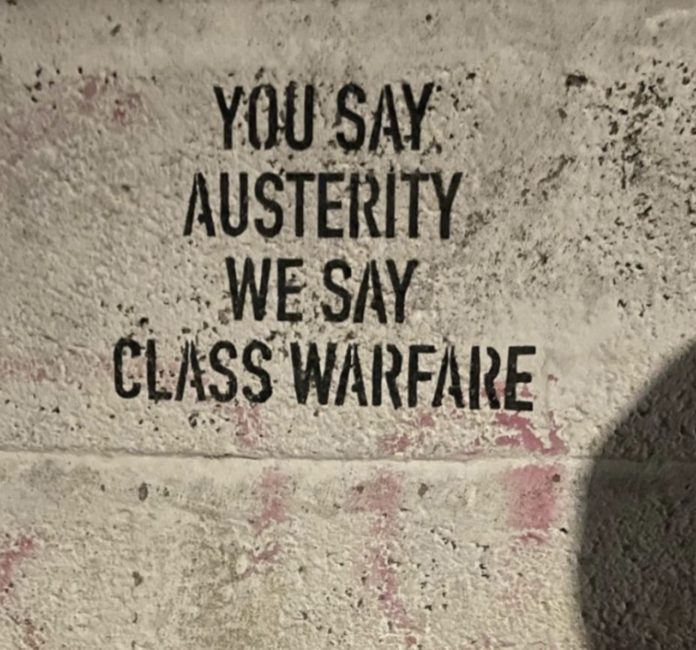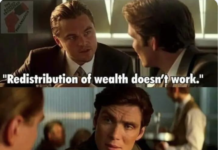The past indicates what to try or avoid in the future to grow wealth. A brief potted history of the economy will help identify some insights about wealth.
Only a few hundred years ago we were in the age of kings and emperors where wealth was made through military aggression. The Pax Romana was built by the military plough furrowing others political, cultural, and environment rights. The long Spanish Reconquista in a harsh not very fertile landscape taught their leaders that the path to wealth was military adventure, and when the lesson was applied in the Americas, all Europe learnt.
The 16th century age of mercantilism viewed the economy as a fixed size pie, so to keep or increase their piece of ‘pie’ they repeatedly attacked each other.
Britain defended ‘her’ colonial empire through divide and rule tactics using racist aggression to dominate peoples and then enforced rules that allowed private companies to exploit. The British Opium Wars were to defend free trade, but only in the sense some British elites could profit from the hard drugs trade. Demand and supply is an offensive concept here.
Hitler believed in autarky – economic self-sufficiency – because trade bled the money out Germany, and why would good Germans want to buy foreign goods. He spent and there was a boom but money began to run out as trading income was low, but imports like Swedish iron ore for armaments still had to be paid for. His autarky was actually about taking living space from his ‘inferior’ neighbours, i.e. he wanted/needed a resource rich european empire.
And the United States twisted trading in Central America by aggressive military support for US private enterprise, like the United Fruit Company. The invasion of Iraq was about oil. So we stand on the precipice of today about to step into the future, and what have we learnt.
Military capitalism has been the normal tool for economic expansion, and wealth ‘creation’, mostly for elites. It set’s the groundwork to accumulate wealth from the disadvantage of others. It’s rubbish about wars being good for the economy. It’s solely because war allows a government to focus resources that makes the economy work so well.
However, in peace times there are some great examples of economies booming because government has focused on lifting huge numbers of people out of poverty. Economies became incredibly strong in that process. The Soviet Union in the 1930’s turned from a largely rural poverty stricken state broken by civil war into an industrial superpower at the same time as all the western democracies were struggling in the depression. The magnificent government interventions under the policies of John Maynard Keynes after World War Two (along with the hysterically anti-communist cold war Marshall Plan). And the Green revolution especially in India. Big government worked.
And I agree with conservatives raging over evil oppressive Stalin but they need to take the log out of their own eye. All the great examples of private enterprise wealth creation have benefited from vicious oppression conducted by government at the behest of wealthy elites – slave trading to exploit colonial empires, theft by trade suppression e.g. cotton trade in India. Britain’s Industrial Revolution’s exploitation of working people, with child labour the norm. Peterloo massacre.
But perhaps even worse, private enterprise’s natural state of wealth inequality is based on raw power. Even Adam Smith said it in ‘Homo economicus’ – ‘It is only under the shelter of the civil magistrate that the owner of that valuable property,…, can sleep a single night in security.’
Even the great United States boom periods after the civil war to 1929 were based on government stealing Indian lands and resources for railways, mining and farming. Same in New Zealand with theft of land and livelihoods from Maori. And the benefits and negative consequences of these government thefts and oppressions are still felt today through all these regions. To celebrate the advancements of these societies is simply to celebrate the victors of war. The economy was slanted their way.
And private enterprise can lay no claim to the improvements of working peoples lives through any of these periods of time. All advances in the wealth of the majority of ordinary people, with help from government, have been pulled by workers through the clenched teeth of private enterprise elites.
Yes private enterprise can claim that they took others scientific advances and made money from them; like Mr Bell. But it is university research (mostly government funded) around the world that is organising and pushing our knowledge and technological frontiers. While our private enterprise sector needs government ‘Research and Development credits ‘ to get them to try and do any R&D.
We all know this; so how is the staggering importance of government in the accumulation of wealth understood today? Amnesia.
Instead we get National/Act neo-liberal claims that government oppresses freedom (it does so when wealthy elites use government to control people), is inefficient and ineffectual, and therefore needs to be small. And National/Act will achieve all this inefficiency and smallness by underfunding government through tax cuts to the rich.
They are attacking government, the most important entity needed for a strong and successful economy. And why aren’t they being called out? Where are the economists calling for active govt control of some of our failing markets? The silence is deafening.
New Zealand history is full of market failures and it was government that fixed them. Government set up a Bank Of New Zealand, State Insurance, a Public Trust, A Ministry of Works, Electricity Boards, New Zealand Railways, etc. All these were set up in the past because private enterprise fails. The markets send the wrong signals; wealthy entrepreneurs are risk minimisers and not risk takers. The introduction of government departments kept costs down throughout the economy and delivered focused outcomes. Private enterprise occupied the margins not the utilities.
For our economy to move out of the low wage, low growth, high inequality model it is currently stuck in, it needs to rediscover the power of government providing essential goods and services. And private enterprise needs to be ignored and not encouraged in these areas.
But worse our Green/Labour government is paranoid about their ‘economic credibility’ for electability so lacking in courage they damage their policies to align with private enterprise. The two most egregious current examples are the emissions trading scheme and the housing policies. Both of which are centred around stimulating private enterprise to maximise private profit, which won’t reduce emissions or create affordable housing. In fact both schemes damage work towards these objectives.
This is not about stupidity, it is about poor choices in assumptions to work from. And our economists who should be guiding policy are failing.
Economics must put government back at the centre of the economy and to do that effectively we must fund government properly and that means improvements to our tax system.





Capitalism has raised more people out of poverty than any other monetary system.
Capitalism? Or imperialism?
But there appears a few chapters missing from the book, Bob the First
Hi Bob the first; It’s probably more accurate to say it’s brought more people into poverty – by the concentration of wealth -and it was govt actions around health and education that have lifted them out
Some really good ideas about increasing tax revenue in this essay.
It looks like a handbook for this government.
I have a question @ Steven Minto.
I was wondering… nothing really, just a small matter.
When you talk of central government spending money to do this and that for the betterment of all over and above the crooks who steal it… who’s money is it again?
When you talk of taxation versus the mythology of merciless private enterprise, who’s money are we spending? Who’s money are THEY spending… Tell me? Exactly who’s money is it? Where did it come from? What, was manufactured, exported then sold to give us an economy that isn’t where most people live in the bush under a leafy branch. Where there was once proper first world living standards that gave we Kiwi’s that which was sold to buy 14 billionaires and 3118 multi-millionaires while propping up the rapacious greed of now four foreign owned banks making record profits from us while there’s still enough fat left on the calf to keep us from literally dying where we age.
Who’s. Money. Is. It? Who’s. Money. WAS. it? Where. Did. and .Does .Our .Money .Come .From?
It’s going to be painful but I think you can do it.